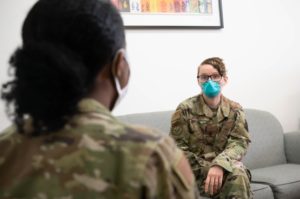Report Compared Reserves, Guard to Active-Duty Troops

Maj. Laura Johnson, 341st Operational Medical Readiness Squadron mental health flight commander, speaks to an airman in her office in June at Malmstrom Air Force Base, MT. A new study suggests that active-duty servicemembers get better mental health treatment than members of the National Guard or the Reserves. U.S. Air Force photo by Heather Heiney
SANTA MONICA, CA – Members of the reserve component of the U.S. military were much less likely to receive recommended mental healthcare when compared to active-duty personnel, according to a new RAND Corp. study.
The study assessed care delivered by the military to more than 93,000 servicemembers, both the active and reserve component, diagnosed with post-traumatic stress disorder, depression, or substance use disorder during 2016 and 2017. The reserve component (RC) is an umbrella group that includes National Guard members, as well as those who belong to the Reserve force.
The report, developed by authors from RAND’s Santa Monica, CA, office and colleagues, found that full-time personnel in the U.S. military’s active component (AC) almost always receive behavioral health care in MTFs and usually from behavioral health specialty providers. RC personnel, on the other hand, have to rely much more heavily on private-sector contracted care and primary care providers, they pointed out.
RC personnel also are less likely to receive recommended treatment for PTSD, depression and substance use disorders. The problem is exacerbated, according to the authors, for reservists who live in areas that are remote from MTFs.
“We looked at all of the care that they received from the Military Health System for post-traumatic stress disorder, depression or substance use disorder,” co-author Kimberly A. Hepner, PhD, told U.S. Medicine. “We looked at their care in 2016 and 2017, so this was before COVID. We looked at how they accessed care through the Military Health System and how that differed between active component and reserve component, but more importantly, we looked at whether or not servicemembers received care that was recommended for their condition and found several differences where the reserve component servicemembers were less likely to receive recommended behavioral healthcare compared to active component. Basically, all the servicemembers that were seen by the MHS for these conditions during this time period and we were able to look at their care.”
The report stated that high-quality, evidence-based behavioral health treatment is “central to individual well-being and the overall health of the force. However, there has been little research to date on the behavioral health care that National Guard and reserve personnel—collectively known as the reserve component (RC)—receive from the MHS.”
‘Tested Like Never Before’
In a commentary written for the website Real Clear Defense entitled “Supporting the Mental Health Needs of National Guard and Reserve Members, “ Hepner, a senior behavioral scientist and a licensed clinical psychologist at RAND, and colleague Justin Hummer, PhD, an associate behavioral and social scientist at RAND Corp., who also was a part of the RAND research report, wrote, “over one million U.S. military service members are members of the National Guard or reserves. These troops are being tested like never before, yet they do not receive the same physical and mental health care coverage provided to their active-duty counterparts, a gap that a recently introduced bipartisan bill seeks to address.
“For those with mental health concerns, having consistent access to high-quality treatment is not only essential to their own recovery and well-being but vitally important to military readiness.”
The “Healthcare for our Troops Act” was introduced in May by Rep. Andy Kim (D-NJ) and Rep. Congressman Trent Kelly (R-MS). It seeks to make no-fee healthcare available to the more than 800,000 Americans serving in the Reserves and National Guard.
Hepner and Hummer wrote that some referred to 2020 as “The Year of The Guard” due to the “continuous activations for domestic missions supporting responses to the COVID-19 pandemic, several natural disasters, civil disturbances and unrest, and Department of Homeland Security activities at the southern border. As a result, 2020 required one of the highest mobilization levels of the National Guard since World War II. This may contribute to an increase in the use of health care benefits, particularly those associated with mental healthcare.”
“In our work, we found several areas where the reserve component servicemembers were less likely to receive recommended behavioral healthcare compared to active component service members and I will say we don’t know why,” Hepner told U.S. Medicine. “Our report doesn’t address why we are seeing these differences.
“We have raised in our report the possibility that dealing with the changing coverage, that the reserve component deal with over time. They could perhaps go through receiving TRICARE coverage; they might receive coverage from the VA; they might receive employer-based coverage through their own job or through a spouses’. We don’t know why we’re seeing this difference in behavioral healthcare, we did raise the possibility of looking at can more consistent coverage help to resolve this gap.”
Hepner pointed out that interest in understanding the insurance coverage that National Guard and reserves receive has increased. She noted that Army Lt. Gen. Daniel Hokanson, the chief of the National Guard Bureau, has called ensuring parity of coverage, meaning similar coverage for National Guard members compared to active component members, one of his top priorities.
The findings “also highlight pathways to improvement for the MHS as part of its ongoing transition to a more centralized model for delivering and overseeing health care across the force,” the report said.
Some of the recommendations from the report include:
- The MHS should “monitor and continue taking steps to improve access to high-quality behavioral health care for RC personnel, with a focus on reducing differences in care quality between RC and AC personnel and between remote and non-remote RC personnel.”
- The MHS should “seek to clarify the unique barriers that RC service members face in accessing behavioral health care and to identify the drivers of the differences in receipt of recommended care between RC and AC personnel.”
The military services and VA have made some efforts in that direction. The Veteran Center Outreach Initiative is designed to give National Guard members access to the same type of counseling services often available in more populated areas. The program, which began in 2016, allows mobile vet center staff members, who operate under the VA’s Readjustment Counseling Service, to visit full- or part-time Guard members during unit training.
The RCS coordinates with Guard behavioral health representatives at state and unit levels on when vet center staff members can provide services to Guard members.

